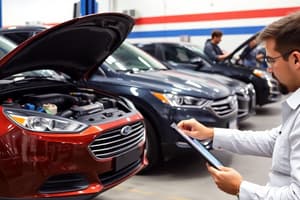Podcast
Questions and Answers
What is a benefit of proper tire pressure?
What is a benefit of proper tire pressure?
- Increased risk of tire failure
- Reduced engine performance
- Improved fuel efficiency (correct)
- Decreased traction and braking performance
When should you check tire pressure?
When should you check tire pressure?
- At least once a month, before long trips, and when tires are cold (correct)
- Only when the vehicle is stationary
- When tires are hot
- When driving long distances
What is the primary function of engine oil?
What is the primary function of engine oil?
- To cool the engine
- To improve fuel efficiency
- To lubricate engine components and cool the engine (correct)
- To remove contaminants and lubricate engine components
How often should you typically change your oil?
How often should you typically change your oil?
What is the purpose of replacing air filters?
What is the purpose of replacing air filters?
How often should you replace your wiper blades?
How often should you replace your wiper blades?
What is a consideration when choosing the right type of oil?
What is a consideration when choosing the right type of oil?
Why is regular filter replacement important?
Why is regular filter replacement important?
What is a sign that your wiper blades need to be replaced?
What is a sign that your wiper blades need to be replaced?
What is the purpose of checking the owner's manual for oil change intervals?
What is the purpose of checking the owner's manual for oil change intervals?
Flashcards are hidden until you start studying
Study Notes
Vehicle Maintenance
Tire Pressure
- Proper tire pressure can improve fuel efficiency, handling, and safety
- Underinflated tires can lead to:
- Decreased fuel efficiency
- Increased wear and tear
- Reduced traction and braking performance
- Increased risk of tire failure
- Check tire pressure:
- At least once a month
- Before long trips
- When tires are cold (not driven for at least three hours)
- Use a tire pressure gauge to ensure correct pressure, as specified in the owner's manual
Oil Change
- Regular oil changes are essential for engine longevity and performance
- Engine oil:
- Lubricates engine components
- Cools engine
- Removes contaminants
- Oil change intervals:
- Typically every 5,000 to 7,500 miles (8,000 to 12,000 km)
- Check owner's manual for specific recommendations
- Types of oil:
- Conventional oil
- Synthetic oil
- Synthetic blend oil
- Considerations:
- Oil viscosity (thickness)
- Oil type (e.g., diesel, gasoline)
Filter Replacement
- Regular filter replacement is crucial for engine performance and longevity
- Types of filters:
- Air filter
- Oil filter
- Fuel filter
- Filter replacement intervals:
- Typically every 15,000 to 30,000 miles (24,000 to 48,000 km)
- Check owner's manual for specific recommendations
- Benefits of filter replacement:
- Improved fuel efficiency
- Increased engine performance
- Reduced emissions
Wiper Blades
- Good visibility is essential for safe driving
- Wiper blade replacement:
- Typically every 6 to 12 months
- Or when showing signs of wear (e.g., chattering, streaking)
- Types of wiper blades:
- Conventional blades
- Beam blades
- Silicone blades
- Considerations:
- Blade material and quality
- Windshield type and condition
Studying That Suits You
Use AI to generate personalized quizzes and flashcards to suit your learning preferences.




